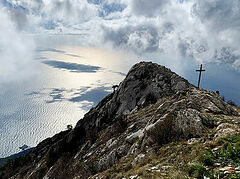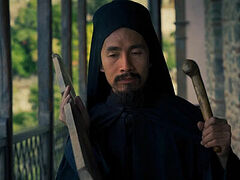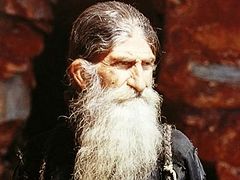 Hieromonk Isaac-Atallah Hieromonk Isaac-Atallah, originally from Lebanon, one of the elders of the Holy Mountain especially revered in the Antiochian Orthodox Church and a disciple of Venerable Father Paisios the Athonite, a great contemporary saint, reposed in the Lord on July 16, 1998. Owing to his efforts, the first book about the elder was put together and later became widely known and translated into many languages[1]. At the same time, not much is known about its author; the foreword to his book shares a few bits of information about his life. We offer our readers an opportunity to fill in the blanks and learn about him from a few sources available in Arabic. The present story is based on recollections of Anthony, Fr. Isaac’s brother and recorded by Anthony’s son-in-law Fr. Melhem al-Hourani, presently a priest in the village of Mhaidse in Mount Lebanon[2].
Hieromonk Isaac-Atallah Hieromonk Isaac-Atallah, originally from Lebanon, one of the elders of the Holy Mountain especially revered in the Antiochian Orthodox Church and a disciple of Venerable Father Paisios the Athonite, a great contemporary saint, reposed in the Lord on July 16, 1998. Owing to his efforts, the first book about the elder was put together and later became widely known and translated into many languages[1]. At the same time, not much is known about its author; the foreword to his book shares a few bits of information about his life. We offer our readers an opportunity to fill in the blanks and learn about him from a few sources available in Arabic. The present story is based on recollections of Anthony, Fr. Isaac’s brother and recorded by Anthony’s son-in-law Fr. Melhem al-Hourani, presently a priest in the village of Mhaidse in Mount Lebanon[2].
A future Hieromonk Isaac (his secular name is Fares Atallah) was born on April 12, 1937, in the village of Nabay in the region of North Metn, Mount Lebanon, into the family of pious Christians Martha and Nemr Atallah. He was the eldest of ten children. His father possessed a fine voice and sang as a cantor at a local church, so Fares learned to love Church from him. Fares enjoyed solitude and would often retreat to pray in seclusion. One day, he left home and went to the monastery of Prophet Elias[3] hoping to stay there, but he had to come home because at the time, the monasteries didn’t accept the eldest son in a family, who was assumed to become the provider for his parents.
Fares enjoyed solitude and would often retreat to pray in seclusion
When he was 12, Fares’ mother died and his father remarried. The young man learned carpentry and found a job in Beirut. He used to come home late and his father would reprimand him for being late. It soon became known that he was late after attending lessons in Byzantine chanting organized by Mitri el-Murr, Protopsaltes of the Church of Antioch.
Before making his fateful decision, Fares spent two years working as a cook at the luxury Phoenicia Intercontinental Hotel’s restaurant in Beirut. In 1962, he resigned from his job and returned home. He handed his savings account book over to his father and said: “This savings account was opened in your name. When it matures, please withdraw the money and distribute it equally among our family members. I need nothing because I am going to a monastery.” Father asked: “Is there anything missing in your life? What should I do to stop you from going to a monastery?” Fares answered: “Even if you gave me all the riches of this world, I wouldn’t be attracted to them. My heart is not in this world but in a monastery.” Saddened, his father called his other children to assist him in dissuading their older brother but he was firmly resolved to change his life forever.
 Hieromonk Isaac-Atallah That same day, accompanied by his brother Anthony, Fares traveled to the Dormition monastery in the village of Bkeftin[4] he had never visited it before, knowing it only by name. However, he knew its abbot, Archimandrite Yuhanna (Mansour) († April 3, 2018), the future Metropolitan of Lattakieh[5] in Syria. At the time, the monastery was lying partly in ruins, and the abbot and another monk (presently, Archimandrite Fr. Yuhanna (Maalouli) were its only residents. When he reached the gates to the monastery, Fares fell to his knees and said, crossing himself: “I thank you, Lord! My dream came true today.”
Hieromonk Isaac-Atallah That same day, accompanied by his brother Anthony, Fares traveled to the Dormition monastery in the village of Bkeftin[4] he had never visited it before, knowing it only by name. However, he knew its abbot, Archimandrite Yuhanna (Mansour) († April 3, 2018), the future Metropolitan of Lattakieh[5] in Syria. At the time, the monastery was lying partly in ruins, and the abbot and another monk (presently, Archimandrite Fr. Yuhanna (Maalouli) were its only residents. When he reached the gates to the monastery, Fares fell to his knees and said, crossing himself: “I thank you, Lord! My dream came true today.”
In the evening, Anthony returned home where their family eagerly awaited his arrival. “Where did Fares go?” his father asked. “To the monastery in Bkeftin. Judging by its shabbiness, I assure you, two days won’t pass until we see him back home, for he is used to the lifestyle he led working at the hotel in Beirut.” His father sighed: “I don’t think so. No matter how much hardship he faces, he will never return home.” That’s exactly how it happened.
Fares stayed at this monastery for about three months and then went to reside in Balamand Monastery[6] where he studied at the seminary. He was living there when Bishop Ignatius (Khazim), a future Patriarch of Antioch (1979-2012), was the abbot of the monastery.
In 1963, Fares was ordained a deacon with the name Philip in honor of Apostle Philip. His ordination took place at the monastery of Great Martyr Jacob the Persian in the Lebanese village of Deddeh (the Diocese of Tripoli). He was a monk of the Balamand monastery, carrying out the obedience of a provisor monk. Later on, he studied Greek on Patmos and at the theology course at the University of Thessaloniki (Greece) while serving at the Cathedral Church of Great Martyr St. Demetrius of Thessaloniki. Many faithful would come there only to hear him proclaim Ektenia in Greek and Arabic. That’s when he learned about monasticism on Mount Athos and met Elder Paisios, his future father confessor.
Upon his return to Lebanon, Fr. Philip was ordained a priest by Patriarch Elias IV (1970-1979) of Antioch in Balamand Monastery. In 1973, he went to reside at the monastery of St. George in “Hamatoura”,[7] which had been deserted for a long time. Owing to his efforts, the monastery was restored, while he gave all of himself, caring for the spiritual welfare of the flock from a nearby village.
A civil war erupted in Lebanon in 1975 and the monastery ended up in the combat area. Fr. Philip had to flee the country and return to Thessaloniki. At the time, he served at the St. Barbara Church and offered spiritual care to the seminarians from Balamand (due to military actions, the Balamand Theological Institute had to evacuate to Thessaloniki in 1975 remaining there until 1979). At Fr. Philip’s request, Metropolitan George (Khodr) of Mount Lebanon issued a gramota of release in 1978 and Fr. Philip permanently moved to Greece. He took the monastic vows on the Holy Mountain with the name of Isaac in honor of St. Isaac the Syrian.
Fr. Isaac spent his first year at the Stavronikita monastery under the spiritual guidance of Elder Paisios, his spiritual father, and later moved to the Holy Resurrection Kalyva in Kapsala not far from Karyes, the capital village of Mount Athos. He rebuilt the destroyed kalyva and lived there for the next four years in solitude and asceticism, battling a great many temptations. Once, at the time of a particularly intense mental torment, he found an abandoned grave in the middle of the forest. As soon as he stopped next to it, he prayed, saying, “That’s where I am going to die!” and the thoughts that tormented him all but disappeared. In the Athonite tradition of preserving the memory of death forever etched in one’s mind, Fr. Isaac dug out a grave for himself in the garden next to his kalyva, censing it daily.
Fr. Isaac dug out a grave for himself in the garden next to his kalyva censing it daily
A devout monastic, an ascetic and a man of prayer, Fr. Isaac was known to be very strict toward himself, for that was the direction of the spiritual life he had adopted from St. Paisios. Appearing austere at first, he would later show genuine fatherly concern for those who sought his spiritual advice. He was particularly devoted to the mystery of repentance and called on everyone to give frequent confession. He retreated from the world, never cutting his connections with it, and remained, as St. Paisios aptly remarked, one of those “radio operators of God” who, away from the hustle and bustle, stayed tuned to the needed spiritual wavelength in order to pick up the signals, only to release them back to the outside world.
The brotherhood he founded was living the life of extreme asceticism: their kalyva had neither gas nor electricity; the monks didn’t use a shower or heater and possessed no money. They stocked up firewood for cooking and heating and got their water from cisterns. The brethren carried out obediences of offering spiritual guidance to pilgrims, engaging in handiwork and publishing.
Fr. Isaac translated spiritual writings from Greek to the Arabic language. He helped his fellow Arabic-speaking Christians discover the spiritual legacy of his patron saint, Venerable Isaac the Syrian, by publishing the translation of his book, Ascetic Homilies, together with the hagiography and a full-service text to the saint (the first edition was published in 1983 in Lebanon). Additionally, there were publications of his Arabic translations of The Ladder and the works by St. Paisios the Athonite: his Epistles, the book, Elder Hadji-George the Athonite, and, The Life of the Russian elder Tikhon, St. Paisios’s spiritual father, among others.
 The first biography of Elder Paisios of Mount Athos was a special offering of Fr. Isaac to the Orthodox world. He began working on the book about his spiritual father two years after Fr. Paisios’ death. Fr. Isaac was never able to finish his work (departing this life four years after St. Paisios departed). It was Fr. Euthymius, his disciple, together with the brotherhood of Holy Resurrection Kalyva, who finished his work and got the book ready for publication. The first edition was published in 2004, bearing Hieromonk Isaac’s name as its author.
The first biography of Elder Paisios of Mount Athos was a special offering of Fr. Isaac to the Orthodox world. He began working on the book about his spiritual father two years after Fr. Paisios’ death. Fr. Isaac was never able to finish his work (departing this life four years after St. Paisios departed). It was Fr. Euthymius, his disciple, together with the brotherhood of Holy Resurrection Kalyva, who finished his work and got the book ready for publication. The first edition was published in 2004, bearing Hieromonk Isaac’s name as its author.
Fr. Isaac resided on Mount Athos for a total of 20 years taking occasional trips to Lebanon, Syria, Jordan, and Egypt. As the only Arabic-speaking monastic of the Holy Mountain, he used to welcome in his kalyva the Orthodox pilgrims arriving from the patriarchates of Antioch, Jerusalem, and Alexandria. Through him, many of them have learned firsthand about the Athonite monastic tradition. Among the Arabic-speaking Orthodox, the Holy Resurrection Kalyva even became known under the nickname of the “Antiochian Gates of Mt. Athos.” He would frequently tell them: “I am here to benefit you and the Antiochian Church.”
Fr. Isaac won the love and respect of many Orthodox people in Greece. Priest Fr. Melhem, his brother’s son-in-law, testified that he saw the photographs of “Geronda Isaac” in the homes of many Greeks throughout the country, while on Athos, any mention of Lebanon is immediately associated with his name, since he is revered by the Athonite monks as a holy ascetic elder.
At the beginning of the 1980s, his father Nemr Atallah decided to distribute his wealth among his children. He wanted Fr. Isaac, who resided on Athos, to take the lead and handle it as the oldest brother. His younger brothers wrote to him about their father’s wish. Soon, they received a letter in which Fr. Isaac asked them, “Have you ever thought of getting at least a tiny lot prepared for you in heaven instead of worrying about material things that are of this world?” Since Fr. Isaac didn’t come, his father single-handedly took care of the partitioning of the inheritance dividing it equally among all members of their family, including the eldest son. A few months later, Fr. Isaac arrived in Lebanon. He visited his father who told him about the partitioning and his allotted share. Thanking his father for the love and care, the Athonite asked him to divide it equally among his brothers and sisters because he devoted himself fully to God and hoped to inherit at least a pocket-sized lot in heaven.
At the beginning of the summer of 1998, Fr. Isaac’s health deteriorated and he had to leave Mount Athos for Thessaloniki to be treated at the hospital there. The troubling news reached his family in Lebanon. Fr. Melhem recalled:
“Anthony, Father Isaac’s brother, his nephew George (his brother Joseph’s son), and I decided to come to Greece to get first-hand information about him. Once we arrived there, we went straight to the hospital. No visitors were allowed in Fr. Isaac’s room, but the hospital administration, having learned about the arrival of his family members, allowed us to enter. Anthony was the first to step inside the room. When he saw his brother who was very sick, he couldn’t hold back the tears. But Fr. Isaac greeted him with a smile and spoke first: “My brother, what has brought you here? Were you told I was sick and you wished to see me? I was thinking about you. I had spent many years in prayer and fasting for the sake of meeting the Lord and I feel I am prepared to meet this blessed hour. But I am concerned about you, my brother, as you dedicate all of yourself solely to work. Have you done anything to prepare yourself for your final hour? Are you ready to meet the Lord?”
The following story comes to mind about Fr. Isaac’s stay in the hospital. When his spiritual child Fr. Euthymius (a future abbot of Holy Resurrection Kalyva in Kapsala) was reading the prayers before him, one of them had the word “death” mentioned a few times. Fr. Euthymius paused in confusion, unable to read any further. Fr. Isaac asked him to continue reading the prayer with boldness saying: “What is there to be afraid of? I labored hard for this hour to come, and I am ready.”
One day, during Fr. Isaac’s stay at the hospital, a nurse he had never seen before entered his room. He appealed to her in reproach: “It is shameful to be embarrassed by your name, Sultana!” The nurse froze, because the elder, without ever asking, knew about her name and the pain it caused her. He continued: “Why are you ashamed of your name, my child? Is it because your parents gave you a foreign name and you think it is of Turkish origin, unbecoming of a Christian? Let me tell you, in my country of Lebanon, this name is associated with the Queen[8] of Heaven and the Mother of God, as we call her so! Take joy in your great name and be proud of it.” The nurse bowed down before the elder, kissed his hand, and left after doing the necessary medical procedures. From that moment, she always eagerly assisted this stranger who suddenly became so dear to her after revealing a painful secret and healing her from spiritual suffering. She stayed at his bedside till the end of his hospital stay. When he was discharged, she hurriedly entered his room and took home the bed linen he was lying on. When the news came of his passing, Sultana realized what treasure she had received from the Lebanese ascetic. As the linen closet was opened, the room would immediately become filled with fragrance. She used to invite the Orthodox Lebanese who knew Fr. Isaac well so they could touch the fragrant linen as a sign of receiving his blessing.”
 Antiochian pilgrims by Fr. Isaac’s grave
Antiochian pilgrims by Fr. Isaac’s grave
Not long before his death, Fr. Isaac felt a little better and asked to be transferred from the hospital to St. John the Forerunner monastery at Metamorfosi[9]. That’s where he rested in the Lord on July 16, 1998. Hieromonk Isaac (Atallah) was buried in that very grave he had dug for himself near Kalyva of the Holy Resurrection of the Lord on Mount Athos.





